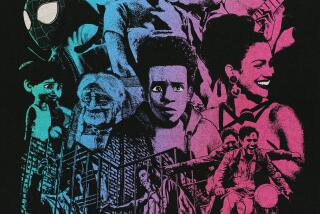Ricardo Montalban dies at 88; ‘Fantasy Island’ actor
Ricardo Montalban, the suave leading man who was one of the first Mexican-born actors to make it big in Hollywood and who was best known for his role as Mr. Roarke on TV’s “Fantasy Island,” has died. He was 88.
Montalban died Wednesday morning at his Los Angeles home of complications related to old age, said his son-in-law, Gilbert Smith.
Within the entertainment industry, Montalban was widely respected for his efforts to create opportunities for Latinos, although he and others believed that his activism hurt his career. In 1970, he founded the nonprofit Nosotros Foundation to improve the image and increase employment of Latinos in Hollywood.
“He paved the way for being outspoken about the images and roles that Latinos were playing in movies,” said Luis Reyes, co-author of “Hispanics in Hollywood” (2000).
On Wednesday, actor Edward James Olmos called Montalban “one of the true giants of arts and culture.”
“He was a stellar artist and a consummate person and performer with a tremendous understanding of culture . . . and the ability to express it in his work,” Olmos told The Times.
Montalban was already a star of Mexican movies in the 1940s when MGM cast him as a bullfighter opposite Esther Williams in “Fiesta” and put him under contract. He would go on to appear alongside such movie greats as Clark Gable and Lana Turner.
When major film roles dried up for him in the 1970s, he turned to stage and eventually TV, where he was familiar to millions as the mysterious host whose signature line, “Welcome to Fantasy Island,” opened the hit ABC show that aired from 1978 to 1984.
While “Fantasy Island” was renewing Montalban’s career and giving him financial stability, he also won an Emmy for his performance as Chief Satangkai in the 1978 ABC miniseries “How the West Was Won.”
In the 1970s and ‘80s, Montalban was also familiar to TV viewers as a commercial spokesman for Chrysler. He was later widely spoofed for his silky allusion to the “soft Corinthian leather” of the Chrysler Cordoba, although no such leather existed.
While making “Fantasy Island,” Montalban also gave one of his best movie performances -- as Khan Noonien Singh in the “Star Trek II: The Wrath of Khan” (1982), a follow-up to a beloved 1967 “Star Trek” television episode that also featured Montalban.
New Yorker magazine critic Pauline Kael said Montalban’s performance as Khan “was the only validation he has ever had of his power to command the big screen.”
Born Nov. 25, 1920, in Mexico City, Montalban was the youngest of four children of Castilian Spaniards who had immigrated in 1906 to the city, where Montalban’s father owned a dry goods store.
Montalban came to Los Angeles as a teenager with his oldest brother, Carlos, who had lived in the city and worked for the studios.
“I felt as if I knew California already, because of the movies,” Montalban said in “Reflections: A Life in Two Worlds,” the 1980 autobiography he wrote with Bob Thomas.
Montalban studied English at Fairfax High School, where an MGM talent scout noticed him in a student play. He was offered a screen test, but his brother advised him against taking it and took him on a business trip to New York City.
The handsome Montalban soon found himself the star of a short film that was made to play on a screen atop a jukebox. That three-minute movie, which debuted at the Hurricane Bar in midtown Manhattan, led to small roles in plays.
When his mother’s illness took him back to Mexico, Montalban got a one-line role in a parody of “The Three Musketeers,” starring Cantinflas. Around that time, he also met Georgiana Belzer, a model and Loretta Young’s sister, whom he married in 1944. She died in 2007.
Montalban intended to stay in Mexico, where his film career was taking off, but MGM wanted him for “Fiesta.” In the 1947 musical, he had a memorable dance scene with a young Cyd Charisse.
“Fiesta” led to a contract at MGM, where he had a friendly rivalry with Fernando Lamas -- later Williams’ husband off-screen -- as the studio’s resident “Latin lovers.” Bill Murray immortalized the duel between the two men with his classic “Saturday Night Live” skit, “Quien es mas macho, Fernando Lamas o Ricardo Montalban?”
Montalban appeared as the Latin lover with Williams in two other late-1940s films, “On an Island With You” and “Neptune’s Daughter.” The blatant typecasting continued in the 1953 film “Latin Lovers” with Turner.
“He was incredibly handsome, he gave a style and dignity to all of his roles -- no matter what role he played,” said author Reyes.
Director John Sturges gave Montalban the leading role of Lt. Peter Morales in “Mystery Street” in 1950 and, that same year, a starring role with June Allyson and Dick Powell in “Right Cross.”
But, as Montalban wrote in his autobiography, he was never cast in the dramatic role at MGM that would have made him a major movie star.
“He appeared to have everything else -- a marvelous camera face, the physique of a trained dancer, talent, a fine voice (he could even sing), warmth and great charm,” Kael wrote. “Maybe the charm was a drawback -- it may have made him seem too likable.”
While making the 1951 Gable western “Across the Wide Missouri,” Montalban fell from a horse and injured his spine. The injury caused him to walk with a limp, which he tried to mask during performances. In recent years, he had been confined to a wheelchair.
After MGM dropped him in 1953, Montalban went on the road with Agnes Moorehead and others in George Bernard Shaw’s “Don Juan in Hell,” which was revived 20 years later on Broadway with him in the lead. In 1955, he appeared on Broadway in the short-lived “Seventh Heaven” and in the late 1950s starred with Lena Horne in “Jamaica” and earned a Tony nomination.
He played a Kabuki theater actor in the 1957 movie “Sayonara” and co-starred with Debbie Reynolds in the 1966 film “The Singing Nun.” Decades later, he played the evil tycoon in the 1988 comedy hit “Naked Gun: From the Files of Police Squad!” and had a prominent role as the grandfather in “Spy Kids 3-D: Game Over” (2003).
Later TV appearances included the “Dynasty” spinoff “The Colbys” in the 1980s, and he voiced Señor Senior Sr. on the Disney Channel’s animated series “Kim Possible,” which debuted in 2002.
But “Fantasy Island” created his lasting image.
Elegantly attired in a white suit and black tie, Montalban fashioned such an iconic -- albeit somewhat kitschy -- figure that he often reprised the character in subsequent films and television shows.
The show’s executive producer, Aaron Spelling, told TV Guide in 1980 that Montalban gave Mr. Roarke the “otherworldly quality we needed.” Many credited the repartee between Mr. Roarke and the character of Tattoo, played by 3-foot-11-inch Herve Villechaize, for pulling in viewers. Villechaize died in 1993.
Montalban said in TV Guide that his character “manipulates everything and everyone. In the eye of the fantasizer, Roarke has the power of life and death.”
Spelling’s widow, Candy, said Wednesday in a statement: “Aaron was always humbled by Ricardo’s gratitude for ‘Fantasy Island.’ ”
Although Montalban expressed appreciation for his success, he complained that Hollywood lacked respect for Mexican American actors. He said that while under contract at MGM, he portrayed Cubans, Brazilians and Argentines, but almost never Mexicans.
“Mexican is not a nice-sounding word and Hollywood is at fault for this because we have been portrayed in this ungodly manner,” he said. He challenged Hollywood to stop stereotyping Latin actors by casting them only as prostitutes, maids, gang-bangers and bandidos.
Through Nosotros -- “we” in Spanish -- Montalban attempted to highlight and recognize Latino participation in the arts and entertainment. In 1970, the foundation created the Golden Eagle Awards, which annually honors Latino stars, shows and movies.
From 1965 to 1970, Montalban served as vice president of the Screen Actors Guild.
After the Ricardo Montalban Foundation was formed in 1999, the organization purchased the former Doolittle Theatre near Hollywood and Vine to stage Latino productions and named the theater after Montalban.
Judd Bernard, who was Montalban’s publicist in the mid-1950s, told The Times that the actor “was the kindest man, with a lovely sense of humor, a religious man, a marvelous family man.”
The deeply spiritual Montalban once said that the guiding force in his life was his Catholic faith. In 1998, Pope John Paul II made him a Knight Commander of St. Gregory, the highest honor bestowed upon non-clergy in the Roman Catholic Church.
Montalban is survived by two daughters, Laura Montalban and Anita Smith; two sons, Mark Montalban and Victor Montalban; and six grandchildren.
Services will be private.
Muñoz is a former Times staff writer. Times staff writer Valerie J. Nelson contributed to this report.
More to Read
Start your day right
Sign up for Essential California for the L.A. Times biggest news, features and recommendations in your inbox six days a week.
You may occasionally receive promotional content from the Los Angeles Times.






